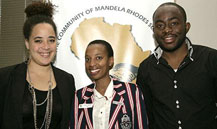 |
|
Kovsie Dux student and SRC member Tumelo Moreri (centre), with Danielle Bowler and Unnel-Teddy Ngoumandjoka, two of the Mandela Rhodes Scholars who attended a summit for past and current recipients of the prestigious bursary on the Bloemfontein Campus.
1 October 2012
Photo: Johan Roux
|
Some of Africa’s top young minds gathered at the University of the Free State to discuss new ways of thinking about education on the continent.
About 50 current and past recipients of the prestigious Mandela Rhodes Scholarship from across the continent gathered on the Bloemfontein Campus to attend the Community of Mandela Rhodes Scholars Summit from 29 September to 1 October 2012. The theme for the summit was Re-Imagining Education in Africa and recipients from South Africa, Kenya, Nigeria and Uganda attended.
Prof. Jonathan Jansen, Vice-Chancellor and Rector of the university, addressed the Mandela Rhodes scholars and told them as Africa’s next generation of leaders they have to be courageous, caring and agents of change. “You cannot re-imagine education unless you have imaginative leaders”, he told them. Referring to leaders like Martin Luther King, Chief Albert Luthuli, Ghandi and Nelson Mandela, Prof. Jansen told them in order to lead, they should have the capacity for caring, contemplation, courage, change,contrition,conciliation and clarity.
Mandela Rhodes Scholar and Convener of the Summit, Andrew Gasnolar, said the insights gained will be utilised by recipients in their spaces. "A consistent element which cropped up was that our privilege requires us to do the right thing. Active citizenry is required in which we all actively take a part in the education situation - from adopting a student to adopting a school to taking up teaching."